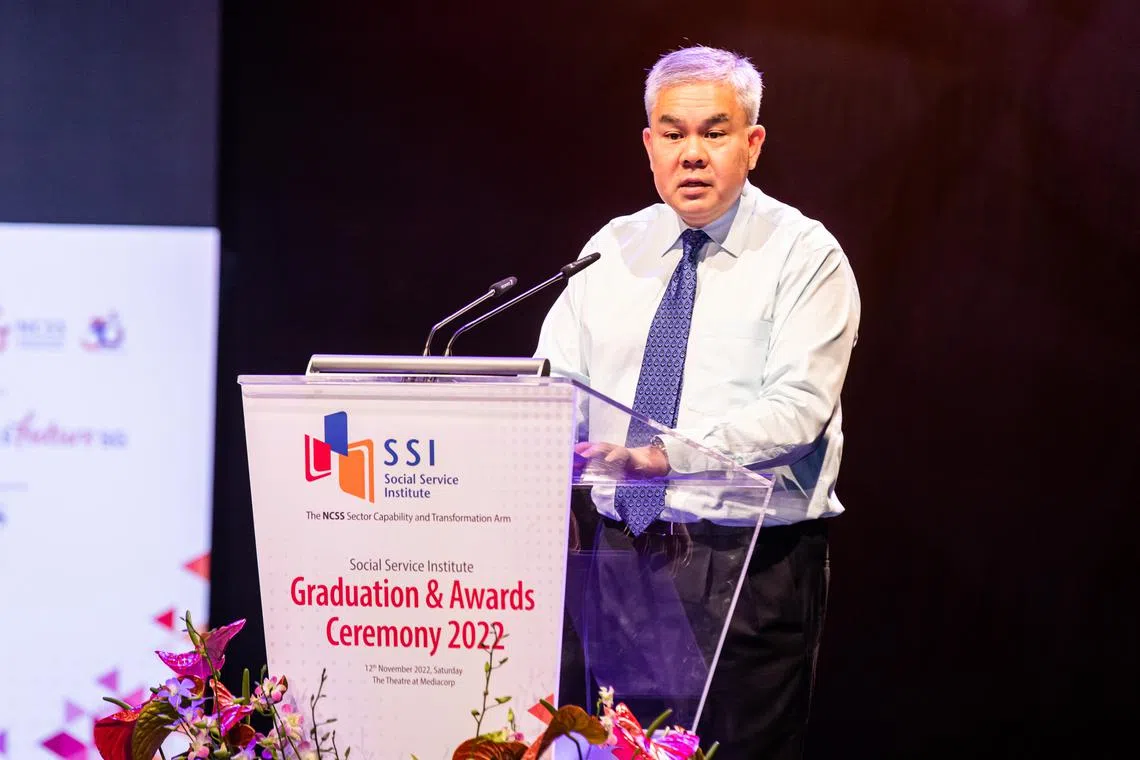Social service agencies to train social workers to care for youth, seniors, people with disabilities
Sign up now: Get ST's newsletters delivered to your inbox

Education Minister Chan Chun Sing with Ms Ong Peiyu, recipient of the WSQ Diploma in Social Service, at the Social Service Institute’s graduation ceremony.
PHOTO: NCSS
Follow topic:
SINGAPORE - Social workers can soon get training from social service agencies to improve their capabilities in dealing with the elderly, youth, families, as well as people with disabilities and those with mental health issues.
From February 2023, seven agencies that are leaders in their field of care will offer such courses to social service professionals seeking to upskill.
These will complement the training offered by the Social Service Institute, the main training provider in the social service sector here, and meet the growing demand for social work upskilling, said the director of the institute, Mr Lee Wee Chee.
The demand is reflected in the number of people enrolling in the institute, which rose to more than 17,000 in 2021, up from more than 14,000 in 2019, he added.
The institute, run by the National Council of Social Service (NCSS), will oversee course development and administration of the seven agencies.
The agencies and their areas of expertise are:
Academy of Human Development (family)
APSN (disability and mental health)
DAS Academy (disability)
Rainbow Centre Training and Consultancy (disability)
Samaritans of Singapore (mental health)
Shine Children and Youth Services (children and youth)
The Salvation Army (eldercare)
Under the five-year initiative launched in November by the NCSS, the agencies will receive funding and resource support to build their training capabilities.
These include boosting their courseware development, training administration and learning facilities, as well as outreach and publicity efforts.
Mr Lee said $3.6 million has been set aside for course fees, consultancy and seed funding.
The aim is to have the agencies train 6,000 social service professionals by 2026.
The seven agencies were selected because they are experts in their care sectors, added Mr Lee. They were also chosen for their strong management and board support, as well as readiness to conduct training.
The Rainbow Centre – which runs three special education schools for children with autism and multiple disabilities – will offer a course on developing the communication skills of those with speech and language impairments.
The centre will also offer, among others, one-day courses on interacting with children with disabilities, and on teaching sexual education to people with developmental disabilities, who are often not given the information they need to express their sexuality in healthy ways.
Course participants will learn to respond appropriately to students’ questions on sex and their sexual behaviours, as well as when students disclose sexual abuse to them.
The Salvation Army will offer basic and advanced courses on dementia and palliative care to support those living with a serious illness.
It will also conduct advanced programmes in healthcare management of eldercare services to help leaders improve systems and processes.
SkillsFuture Singapore will subsidise 70 per cent of the course fees. The subsidy is for both employers that sponsor staff for training, and for self-paying learners wishing to enter the social service and healthcare industries.
APSN, which supports people with mild intellectual disability, will have Workforce Skills Qualifications (WSQ) courses on improving workplace literacy and mental health for people with intellectual disability, among others.
Shine Children and Youth Services will offer a course on supporting children with learning and behavioural needs.
Some of the courses are also open to other stakeholders like caregivers, volunteers and those working in related fields.
Speaking at the Social Service Institute’s graduation ceremony in November – which saw 99 people conferred with WSQ diplomas and advanced certificates in social service – NCSS vice-president Kevin Lim praised two agencies that have invested in staff training.
He said more than 250 employees of Thye Hua Kwan Moral Charities – which runs senior care centres, family service centres and three homes for people with disabilities – attend courses at the institute each year.
New hires have gone for introductory courses on screening tools and casework training, while case workers take courses on assessing the needs of families and devising interventions for them in cases of child protection and family violence.
Each year, about 150 staff members from Care Corner – which helps children, the elderly and married couples – attend Social Service Institute courses on casework training, managing family violence and support tools for families and adults.

NCSS vice-president Kevin Lim praised two agencies which have invested in staff training.
PHOTO: NCSS
Social workers welcomed the move to have social service agencies offer training.
Ms Rachel Tan, head of the marriage support department at Fei Yue Community Services, said that while a social work degree provides social workers with knowledge, training from agencies can equip them with practical skills in engaging children and youth of different ages.
“Social workers should be equipped to work with clients of different ages. It is helpful if there is training for social workers who can then understand the developmental stages of children and youth and potential issues at various stages,” said Ms Tan, 44.
She added: “With more social workers trained to provide marital and family counselling, more families will be supported in a timely manner.”
Ms Chavonne Tan, 33, a counsellor at a family service centre, looks forward to attending training which will give her practical knowledge on mental health issues to complement her counselling degree.
She said: “Mental health issues are on the rise and we did not have many such training opportunities in the past.”
She has been working closely with the Institute of Mental Health this year and enrolled in a mental health course at the hospital because of that.


